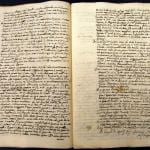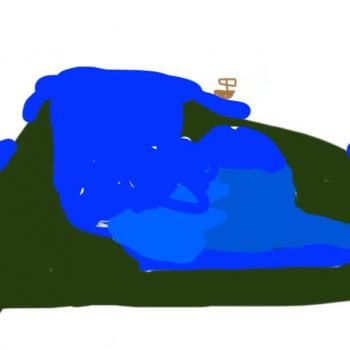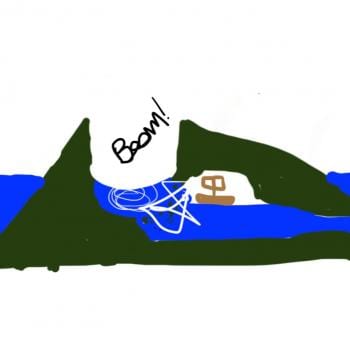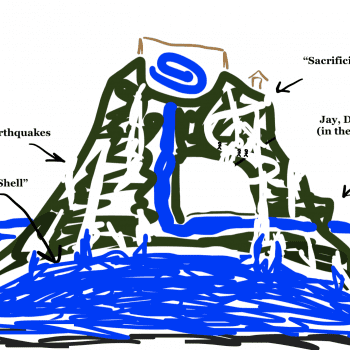Escape from the Island of Aquarius, pp. 49-56
Remember, last week, our brave heroes pretended to go back to their boat (even though no one was watching), and when that didn’t work because they failed to cross the scary rope bridge, they pretended to back to their boat another way (even though no one was watching). When that jaunt confirmed their concern that the island is sinking, they decided to go back to the settlement of dangerous cultists and explore the two paths they’d attempted to explore in the dark the previous evening (but without splitting up this time). The trouble is, to get to that forked path, they have to go through the cultists’ Ohio town in the jungle.
This does not make sense to me. I get that it’s hard to go through jungle without a path, but surely there’s a way to skirt the town instead of running straight through it? They are pretty sure the cultists have killed two people, at this point.
“Lila, you be the eyes,” Dr. Cooper whispered.
She concealed herself in the crook of an old tree and watched the village street. Every once in a while, but only for a few seconds, the street would be empty.
It’s the middle of the morning, remember.
One such moment came. She waved her hand, and Jay dashed down the road into the village, behind a woodshed, and then, with a sharp cut sideways, down that forbidden trail and out of sight just as some carpenters reappeared in the street. They were armed and seemed a bit edgy.
Running through a town of armed killer cultists cannot be the only way to get to the trail on the other side of the town, are you freaking serious.
One by one, they all three run through the town full of armed killer cultists and make it back into the jungle on the other side.
“All right, Dr. Cooper whispered, “here’s the fork we came to last night. No splitting up this time…”
“Thank you,” said Lila.
They take the left fork. As they go along they notice empty burns nests and burrows, and conclude that Dulaney was right—the birds and animals all fled. I have two questions. First, how do they know the animal burrows they see are empty? And second, where exactly did the birds and animals go? If this island were close enough to other islands for animals to swim there—birds are more understandable—I would’ve thought this island wouldn’t be as “mysterious” as they make it out to be.
Finally, they come to a clearing.
There was something wrong, something creepy, about this place. The tall trees overhung it as if they were weeping, or half dead, and a strange, unpleasant stench pervaded the air like something dead and rotting. The place was silent, and the ground was rocky. The many huge stones set up on end here and there made it look like a primitive temple or shrine. They could have been astrological markers, or tables, or pedestals, or …
“Altars?” Dr. Cooper mused.
In the center of the clearing was a wide dip in the ground, or a hole.
The writing isn’t all that bad here, although note again the use of the word “primitive.” The Coopers walk over to the pit; once they approach it they see that it’s about 15 feet deep, with a sandy bottom scattered with bones.
Dr. Cooper knelt down for a closer look. “So … there’s some paganism and witchcraft being practiced here. The pit has been used recently …” he observed, and that very observation was making him ill. “One of the animal carcasses hasn’t been there too long.
“Dad,” Jay said very weakly. “I think I see some human bones down there!”
Note that Dr. Cooper is feeling ill and Jay is feeling weak. They watched a man dragged away at gunpoint—that same man died mysteriously clutching Lila in the dark—but this is what makes them feel ill. That’s interesting. I wonder why.
Dr. Cooper analyzed the pit itself. “Another volcanic vent, I think. It could penetrate deep into the island. Some kind of carnivorous animal must live down there … something that feeds on the … on the offerings.”
He stood up and walked away from the pit. What was the point of talking about it anymore?
Is it because there is witchcraft? I don’t think so, actually—there is nothing in this passage to suggest that they sense anything demonic. They seem to be repulsed by the idea of sacrifice—even before Jay notes that some of the bones look human. They already knew Fake MacKenzie was dangerous. They already knew he was probably killing people. This is a road too far. Why? Because it’s confirmation that Fake MacKenzie is—is what? Is the issue that he’s non-Christian? Or that he’s manipulative and dangerous and appears to be killing people to maintain power and control?
Several readers have noted that Cooper hasn’t been seriously considering that Moro Kunda could be an actual curse—a demonic curse—rather than trickery. Given that the answer to the last book really was demons, this does seem odd—more in a moment.
After Dr. Cooper backs away from the pit, Jay asks whether the noises they heard the previous night could have come from this clearing. Dr. Cooper says he thinks it was from the other direction—presumably down the other path.
“I’ve seen all I want to see,” said Lila.
Queeeeeen.
“I’m going to confront MacKenzie about this.”
That’s Dr. Cooper, of course, and that sounds like a terrible idea. Remind me—why are they still on this island??
At this moment, the Coopers turn to see MacKenzie and a contingent of armed townspeople standing at the edge of the clearing, blocking the trail.
Paretti does this odd narrative thing repeatedly in his books—he ends the chapter with a single line saying that as the Coopers prepared to go explore the other fork in the trial, having finished in this clearing, they heard a twig snap and a rustling, and turned to see that the trail they had come by “was guarded by armed men, their rifles ready and aiming.” And that of course is where the chapter ends. I don’t make much of chapters in my reviews, but every damn one has a dramatic ending like this.
But then, the next chapter starts like this:
More guards appeared at another entrance to the clearing, and they too brandished their weapons. The Coopers were trapped.
“Dr. Cooper,” called a voice, “you should know better! This island is full of eyes, and I know everything they see.”
Of course. There stood Adam MacKenzie, between two body guards, looking at the Coopers with shock and anger all over his face.
Shock isn’t exactly consistent with the air of confidence his voice suggests, but okay. What seems odd to me is the “of course” when they see Fake MacKenzie. Who the heck else were they expecting when they were confronted with armed men on an island they already know is full of armed male cultists—armed male cultists they spent that very morning avoiding?
This is not the only time Paretti has used this odd narrative thing, where he thinks he’s leaving you momentarily in suspense—who are these armed men?—when the “surprise!” moment is actually completely obvious. There has to be a word for this.
“Is this why you didn’t want us venturing into the jungle? Just what is this place, and what goes on here?”
But MacKenzie could not respond. His face had gone pale, and his eyes widened with horror.
It strikes me that Paretti doesn’t yet want us to know whether this curse is invented and controlled by MacKenzie, or not.
“Mor—Moro-Kunda!” MacKenzie cried with a trembling voice.
Oh noes!
MacKenzie’s men start freaking out and don red scarves—their “protectors” against the curse.
The Coopers looked at all the trembling men, and something horrible began to dawn on them.
“Dad, he’s trying to set us up,” Jay whispered desperately.
“I know,” Dr. Cooper replied.
I mean, yeah. Lila could have told you that.
MacKenzie promises he means them no harm, but says they have “invaded sacred ground” and “contracted the curse.”
“You give me no choice,” said MacKenzie with a glint in his eye, “For the sake of my people here, I must have you confined until the curse has … finished its work.”
And so the Coopers find themselves locked up.
“I believe,” said Jay, “I’m getting scared.”
“So you finally admit it,” said Lila.
“Enough, you too!” Dr. Cooper snapped.
Great dynamic. Great, great, great.
Dr. Cooper stared at the thatched roof above them as he said, “Psalm 91 is good for times like this, especially eh parts about the Lord delivering us from the snare of the trapper, and from the pestilence that stalks in the darkness.”
Yes, thatched roof. The other houses don’t have thatched roofs, but this one does. There’s a reason for that, but the Coopers don’t know it yet. Moro Kunda requires a thatched roof.
“What about the curse, Dad?” Jay asked. “What about this Moro-Kunda? It has killed two men—you said that yourself. MacKenzie’s not bluffing.”
“No, son, he isn’t,” Dr. Cooper admitted. “But the question is, is this truly a demonic work, or is it some clever trick MacKenzie uses to scare people?”
This series annoys me.
In the first book, Dr. Cooper refused to consider that the Door in the Dragon’s Throat could be warm and vibrating because there were demons behind it. He insisted on natural causes until it was very nearly too late, because there really were demons behind it. Here, Dr. Cooper once again assumes that there must be natural causes. It’s like the first book never happened.
“This—this curse just seems aa little too handy, a little too much under his control to dish out whenever he wants, on whomever he wants.”
Do you know what? This book would be more interesting if Dr. Cooper started out assuming the curse was demonic, only to later learn that it’s all a manipulation of Fake MacKenzie’s. Then we’d see our character learn something, and we, Paretti’s teenage evangelical readers, might learn something too. We would see our characters grow. Instead, we get none of that.
“What if it’s demonic?” said Jay.
“We pray beforehand so we can rebuke it and chase it off.”
But you can tell Dr. Cooper isn’t seriously considering that idea—he’s already concluded that this is all a trick of Fake MacKenzie’s, which it is, and in so doing it feels as though he has taken away some of the excitement and mystery this book could have held. This is a theme relevant to evangelicals that would have been worth exploring—how can you tell whether something is demonic or, well, not demonic? But instead, it is summarily dismissed before the story really even gets started.
After all, this is only page 56 out of 160.
I mean, what even was the point of mentioning paganism and witchcraft after discovering the sacrificial pit, if the curse gripping the island is going to be summarily written off as complete natural and man-made in the next breath?
Next week? We meet Moro Kunda.
I have a Patreon! Please support my writing!










